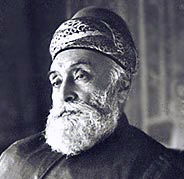Jamshedji Tata
| Jamsetji Tata જમશેદજી તાતા |
|
|---|---|

Jamsetji Tata
|
|
| Born |
3 March 1839 Navsari, Baroda, Bombay Presidency, British India |
| Died | 19 May 1904 (aged 65) Bad Nauheim, German Empire |
| Alma mater | Elphinstone College |
| Occupation | Founder of Tata Steel |
| Net worth | £1 million (1904) [approx. £96,230,000 (2016)] |
| Spouse(s) | Hirabai Daboo |
| Children |
Dorabji Tata Ratanji Tata |
| Parent(s) | Nusserwanji and Jeevanbai Tata |
| Relatives | See Tata family |
Jamsetji Nusserwanji Tata (3 March 1839 – 19 May 1904) was an Indian pioneer industrialist, who founded the Tata Group, India's biggest conglomerate company. He was born to a Parsi Zoroastrian family in Navsari then part of the princely state of Baroda.
He founded what would later become the Tata Group of companies. Tata is regarded as the legendary "Father of Indian Industry".
Jamsetji Nusserwanji Tata was born to Nusserwanji and Jeevanbai Tata on 3 March 1839 in Navsari, a city in south Gujarat. His father, Nusserwanji, was the first businessman in a family of Parsi Zoroastrian priests. He broke the tradition to become the first member of the family to try his hand at business. He started an export trading firm in Mumbai.
Jamsetji Tata joined his father in Mumbai at the age of 14 and enrolled at the Elphinstone College completing his education as a 'Green Scholar' (equivalent of a graduate). He was married to Hirabai Daboo while he was still a student. He graduated from college in 1858 and joined his father's trading firm. It was a turbulent time to step into business as the Indian Rebellion of 1857 had just been suppressed by the British government.
Tata made many trips abroad, mainly to England, America, Europe, China, and Japan to establish branches for his father's business.
Tata worked in his father's company until he was 29. He founded a trading company in 1868 with ₹21,000 capital (worth ₹52 million in 2015 prices). He bought a bankrupt oil mill at Chinchpokli in 1869 and converted it to a cotton mill, which he renamed Alexandra Mill. He sold the mill two years later for a profit. He set up another cotton mill at Nagpur in 1874, which he christened Empress Mill when Queen Victoria was proclaimed Empress of India on 1 January 1877.
...
Wikipedia
